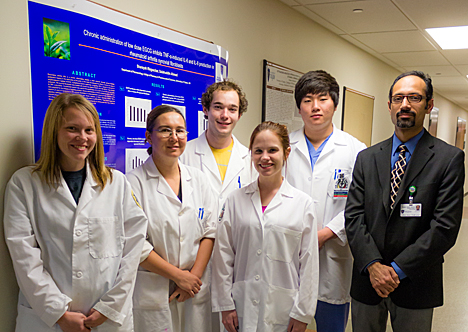
Dr. Salah-uddin Ahmed’s research on rheumatoid arthritis is being funded by a five-year $1.2 million grant from the National Institute of Arthritis and Musculoskeletal and Skin Diseases.
Ahmed recently received a $1.2 million grant from the National Institute of Arthritis and Musculoskeletal and Skin Diseases, part of the National Institutes of Health, to continue his work with the molecule epigallocatechin-3-gallate (EGCG). The grant will fund research on the molecule for five years.
EGCG, which is naturally found in green tea, is a molecule that inhibits inflammatory proteins produced in arthritic joints. Ahmed has been studying this phenomenon in different arthritic models in his lab for years. In early studies, animals with induced arthritis dsiplayed reduced symptoms when given EGCG treatment.
By isolating human synovial cells obtained from joint replacement surgeries and creating an environment similar to that in the joints of patients with rheumatoid arthritis, Ahmed discovered that EGCG is particularly effective against interleukin-6 (IL-6). The molecule IL-6 has been shown to play an important role in the pathogenesis of rheumatoid arthritis, and in high levels it also can affect vital organs like the heart and liver by causing systemic inflammation.
Using human cells and animal models of rheumatoid arthritis, Ahmed’s lab is trying to understand the underlying mechanism through which EGCG inhibits IL-6 mediated inflammation and joint destruction.

Assisting Dr. Salah-uddin Ahmed, right, with his research are students, from left, Maria Beamer, Shay Riegsecker, Wylie Wingerter, Karissa Cottier and Yeahwa Hong.
“What we are trying to test is if we can harness something that is natural, might have less-adverse effects, and be cost-effective, too,” Ahmed said, adding that he would like to continue his research into synthesizing and improving the ECGC molecule to make it more effective.
“One of the advantages I have at UT as a pharmacologist is the collaboration with the Department of Medicinal and Biological Chemistry,” Ahmed said. “We are able to start collaboration with medicinal chemists on campus to see if there are options to modify this molecule and make it work much better.”
Ahmed said he looks forward to engaging students in his research because one of the rewarding aspects of his job is being a mentor to graduate and undergraduate students. He enjoys watching them discover their potentials, learn to conduct biomedical research, and find their suitable career paths.